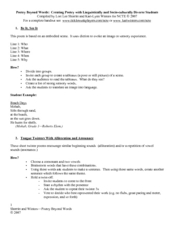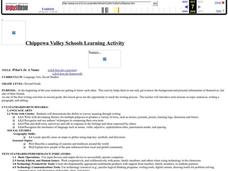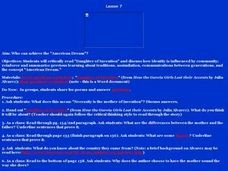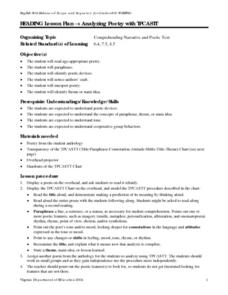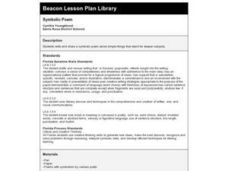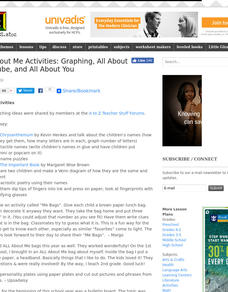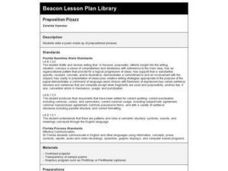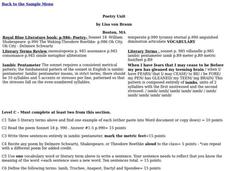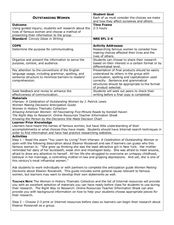Curated OER
Poetry Beyond Words: Creating Poetry with Linguistically Diverse Students
Models of and directions for how to write 20 different types of poems are featured in an NCTE resource. The introduction to each form highlights the embedded concepts. For example, tongue twisters encourage poets to use alliteration and...
Curated OER
Acrostic Poems: What's In a Name?
Young scholars find words that begin with the letters in their own names, using a variety of sources including word banks and online dictionaries. They create an acrostic poem. Pupils revise poems as needed, for meaning and...
Curated OER
What's In a Name?
Students write a story. In this identification lesson, students write their name vertically and think of a word or phrase to match each letter. Students write a paragraph or story based on their name descriptions.
Curated OER
What's In A Name
Second graders write a paragraph about their findings on what their name represents. In this writing lesson plan, 2nd graders will research their name and why they were named that. They will draw a picture that represents them along with...
Curated OER
Who Can Achieve the "American Dream"
Exploring the idea of working to achieve the American Dream, the class reads an excerpt from How the Garcia Girls Lost their Accents by Julia Alvarez. Following, the class analyzes the excerpt and discusses the theme of the reading using...
Curated OER
Analyzing Poetry with TPCASTT
Middle schoolers read a poem and complete a TPCASTT chart. They make a prediction about the title (T) , paraphrase each line (P), identify poetic devices and nuances (C-connotation), explore mood and tone (A-attitude), point out shifts...
Curated OER
Poems of Respect
Students write poems of respect. In this character education lesson, students use the words "please," "thank you," "excuse me," and "I'm sorry" in acrostic poems that define the polite words and phrases.
Curated OER
No Need To Be Puzzled About Me
Fourth graders investigate acrostic poetry by researching the Internet. In this poetry writing lesson plan, 4th graders complete a worksheet detailing their personal activities and interests. Students view the form of an acrostic poem...
Curated OER
Powerful Poetry Presenting the Writer's Soul
Students research Langston Hughes poetry for his use of figurative language. In this poetry analysis instructional activity, students research the life and poetry of Langston Hughes and his use of vivid words. Students complete 23...
Curated OER
Novel Character Study
Students complete a character study using a database to compile information from a novel. They design a five slide presentation highlighting the character's reaction to different situations in the book. They write an acrostic poem using...
Curated OER
Symbolic Poem
Students read and analyze several highly symbolic poems. They create their own symbolic poem, read it to the class, and discuss whether they can guess any hidden meanings.
Curated OER
All About Me
This is an awesome resource for any elementary or middle school teacher about to start a new school year! This resource includes an extensive list of activities for introducing the members of your class to each other. Some of the ideas...
Curated OER
Preposition Pizazz
Young scholars examine examples of poems and identify the prepositions in them. They write original poems using prepositional phrases and create illustrations to go with them.
Curated OER
Nature Walk Poem
Third graders read poetry inspired by nature. They talk a walk in nature or in their neighborhood with paper and pen and write down feelings and perceptions. They write a poem about their walk and share it with the class.
Curated OER
Poetry Unit
Students, after examining three forms of poetry, review and document a variety of literary terms. Vocabulary words are enveloped into the literary terms as well and are cited from each selection by each student.
Curated OER
Personification
Fifth graders read opening pargraphs in their books and discuss with their peers the meaning of personification. They then identify three instances in the poem "Desert Tortoise" of similarities between humans and animals citing...
Curated OER
Gingerbread Baby
Students explore gingerbread stories. In this poetry lesson plan, students read the folk tale "The Gingerbread Man" as well as Gingerbread Baby by Jan Brett and identify rhyming words. Students also make art projects, dramatize the...
Curated OER
Defining Love
After reading and discussing Love Medicine by Louise Erdrich, pupils compare/contrast the concept/theme of love within several multiple pieces of literature. They must support their claims with textual evidence. In addition, they analyze...
Curated OER
Homophones and Vivid Verbs
Young scholars define and practice using synonyms, antonyms, homonyms, and homophones in complete sentences, paragraphs and essays. They include "vivid verbs" in their writing with the aid of a dictionary or thesaurus.
Curated OER
The Outsiders
Are you working on an Outsiders unit? Use this list of activities to deepen your middle schoolers' understanding of the novel. After reading S.E. Hinton's novel, young readers work on three required activities, including participating in...
Curated OER
Outstanding Women
Research the lives of famous women in this social studies lesson. Middle schoolers use various sources to research a famous woman and create a presentation about the accomplishments of the woman. They can find the central idea throughout...
Curated OER
Simile and Metaphor
Middle schoolers use context clues to find the figurative meaning of similes and metaphors in writing. They practice using figurative language to help their writing come alive. Use this activity in a activity about poetry, figurative...
Curated OER
The Odyssey Plan
Ninth graders read and analyze The Odyssey. They apply note-taking skills to identify enemy, type of enemy, and traits demonstrated throughout the book. Students create a storyboard that illustrates the selected episode from the book...
Curated OER
Could You Repeat That?
Students participate in an oral story telling activity designed to show how story embellishments occur. They read "Beowulf" and identify incongruities that suggest additions and embellishments over the years.


